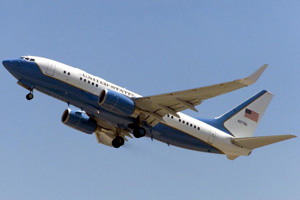
Illustration: Sean McCabe
Adapted from C Street: The Fundamentalist Threat to American Democracy.
THE OLDEST AND MOST politically influential Christian conservative organization in Washington is known to the public, if at all, for one thing: adultery. In particular, that of three Republican politicians, Sen. John Ensign (R-Nev.), Gov. Mark Sanford (R-S.C.), and ex-Rep. Chip Pickering (R-Miss.)—all caught last year in various states of moral undress, all linked to a Capitol Hill townhouse at 133 C Street SE, which the blogosphere promptly tagged “the Prayboy Mansion.” The organization behind the townhouse, which is used to provide subsidized housing for “brothers” in Congress, is known to outsiders as the Fellowship. But its leader, a quietly charismatic octogenarian named Doug Coe, calls it the Family.
Coe is only the second leader of the movement, which began as a fundamentalist anti-labor coalition of political and business elites in 1935. Coe’s mentor, Abraham Vereide, shared with him a revelation from God: For nearly 2,000 years, Christianity, with its emphasis on the down and out, had been getting it all wrong. Their focus would instead be on the “up and out,” the “key men” in positions of power who would be able to usher in the kingdom of God—which, to the Family, has always looked a lot like the country clubs where it conducts much of its soft-sell evangelism. The best way to help the weak, it teaches, is to help the strong. That required first building a ministry in the nation’s capital that would over the years become one of Washington’s most influential, and most secretive, institutions. Dozens of members of Congress from both sides of the aisle are involved in Family prayer groups (Hillary Clinton was a regular in the Senate group), and every president since Eisenhower has attended the organization’s only public event, the National Prayer Breakfast. [READ MOJO‘S COVERAGE OF HILLARY CLINTON’S PRAYER GROUP.]
But while Coe’s Washington operation has drawn more scrutiny of late, what most news accounts have missed is that the Family has also exported its philosophy overseas—by dispatching US politicians to recruit leaders abroad. Members of Congress have traveled the globe, sometimes on the taxpayer dime. They’ve gone to Greece and Japan, Aruba and Hawaii. But much of the travel has been to international trouble spots—the Middle East, Africa, the Balkans—where the footprint of American power (and American aid) is vast, and a congressman complete with entourage and military escort is a VIP indeed.
Many of the “friends” targeted by these congressional missionaries are strongmen such as Omar al-Bashir, the president of oil-rich Sudan, who has been indicted for genocide in the International Criminal Court; and Yoweri Museveni, president of Uganda. (The Family’s Ugandan friends also include David Bahati, the author of a murderous piece of legislation called the Anti-Homosexuality Bill, which mandates the death penalty for some homosexual acts.)
What’s in it for the strongmen? Legitimacy, and a champion back in Washington. What’s in it for the US politicians? Jesus—and, sometimes, profits for themselves or the interests they favor. Many of them have had their expeditions underwritten by the Family: Ensign has enjoyed trips to Japan, Jordan, and Israel that cost nearly $17,000. The list of Family-funded travelers also includes Sen. Tom Coburn (R-Okla.) and Reps. Frank Wolf (R-Va.), Pete Hoekstra (R-Mich.), Robert Aderholt (R-Ala.), and Mike Doyle (D-Pa.), who has done the Lord’s work in Aruba and the Virgin Islands. [SEE “FREQUENT FLIERS,” MOJO‘S BREAKDOWN OF WHERE THE FAMILY’S POLITICAL MONEY GOES.] On other occasions, Coe’s political missionaries charge their travel to the government—putting not just the weight of their office, but the taxpayers’ money, behind an unabashedly religious agenda.
That agenda isn’t about converting the masses. The Family’s goal, according to one internal document, is to create a “hidden structure” of “national and international world leaders bound together relationally by a mutual love for God and the family.” In researching two books on the Family and C Street, I sought to uncover the workings of this hidden structure. I reviewed the Family’s files (592 boxes of documents stored at the Billy Graham Center Archives) and conducted hundreds of interviews. I found that as far as the Family’s “key men” are concerned, the separation between church and state doesn’t extend overseas, and no dictator is too heinous to be embraced as a brother.
PERHAPS THE MOST intriguing of the Family’s apostles—and certainly the most candid—is Sen. James Inhofe (R-Okla.). “I’m guilty of two things,” he has said. “I’m a Jesus guy, and I have a heart for Africa.” The four-term Republican also has a savvy mind with a sharp awareness of Africa’s natural resources, chief among them oil; the petroleum industry is his biggest donor (which may explain his insistence that climate change is a liberal hoax). “I’m trying to get members of the House and Senate to understand how valuable Africa is,” he declares. Inhofe has crisscrossed the continent for the Family, bearing its “principles of Jesus” to leaders from Nigeria to Sudan—and often flying on military planes, to which he has access as the second-ranking member of the Senate Armed Services Committee.
Inhofe looks like the state he represents: flat-faced, wide open, and a little raw. A former Navy pilot, he still flies at age 76—fearlessly, according to friends who’ve taken white-knuckle rides with the senator. He has giant, elegant hands, surprisingly gentle as they float around his points—which are often far from gentle. When he first campaigned for Senate in 1994, he told voters that he was running on the “three Gs—God, gays, and guns.” He once took to the floor of the Senate with a giant photograph of his children and grandchildren and announced, “I’m really proud to say that in the recorded history of our family, we’ve never had a divorce or any kind of homosexual relationship.”
As a young representative, Inhofe attended the Family’s weekly House Prayer Breakfast meeting only out of respect for Oklahoma Rep. Wes Watkins, its chairman at the time. “I assumed I was a Christian,” (PDF) he told an evangelical magazine. But that didn’t mean much more to him than sitting through a service every Sunday. It was an evangelist for one of the Family’s sister organizations, Christian Embassy, who challenged Inhofe to a more zealous faith by suggesting that he was lukewarm toward Jesus. Lukewarm? James Mountain Inhofe—that’s his full name—wasn’t lukewarm about anything! He was a for-or-against man. “So, right there on September 22, 1988, at 2:30 p.m. in the Members Dining Room, I had an experience I will never forget and I gave my life to Jesus.”
Inhofe is just as blunt when it comes to spreading God’s word. On December 21, 2008, the Oklahoman ran a story that might have become a major scandal had it not appeared so close to Christmas.* During the previous nine years, Inhofe had taken 20 international trips, spending at least $187,000 in public money—not including the cost of military transport—to promote what he called “a Jesus thing.” He visited Eastern Europe and the Middle East, but his real focus was Africa, especially Uganda, a country he has adopted as a personal responsibility.
It was the Family’s longtime leader, Doug Coe, who opened Inhofe’s eyes to that responsibility. In a video made in response to the Oklahoman story, Inhofe describes the mission as “the political philosophy of Jesus, something that had been put together by Doug…It’s all scripturally based.” He cites Acts 9:15, an unorthodox reading of which the Family promotes as one of its core principles: “‘Take my name, Jesus, to the kings.’ And, of course, if you’re a member of the United States Senate in Africa, they think you’re important.” He chuckles, slapping the arm of his red leather sofa. “You can always get in to see the kings!”
Inhofe’s first “king” was General Sani Abacha, dictator of Nigeria—Africa’s most populous nation, as well as the US’s fourth-largest supplier of petroleum. Abacha was known for two qualities: the greed that led him to steal $3 billion from his country, and the ruthlessness that made that theft possible. His execution of dissident writer Ken Saro-Wiwa in 1995—two years before Inhofe’s first visit—made international headlines. Abacha already had a long record of brutally dispatching opponents, many of whom happened to be critics of the US and the oil industry. But then, as one Family leader has put it, we all make mistakes. “You can’t help who you are. I mean, can’t he have a friend?“
Inhofe would be that friend. “We went in there,” Inhofe says in the video, “not really knowing what we’re doing. He started talking about political things.” But Inhofe had a greater mission. “I came all the way across the Atlantic,” he told Abacha, “to tell you that in the spirit of Jesus we love you.”
Former Congressman Mark Siljander says he was there, too. “There was a moment when Abacha sent all his aides out of the room,” Siljander later wrote, “and I wondered if I was ever going to see Nancy and my four kids again.” But Abacha was hardly likely to murder two US congressmen in his office. Instead, the two Americans and the Muslim dictator prayed to Jesus. According to Inhofe, Abacha wept.
Nigeria had become a pariah nation by then, and the Clinton administration had condemned Abacha’s coup. But its oil continued flowing to the US despite occasional warnings that Congress, or the administration, might impose an embargo. By the time Inhofe, winner of a lifetime service award from a petroleum industry group, went to Nigeria, analysts worried that the signal Abacha was getting from Washington was that the sanctions threat was all but dead.
If Inhofe’s religious mission in Nigeria had dovetailed with his political agenda, other African trips put religion front and center. By 2003, Inhofe was using his access to foreign leaders to push a Family initiative known as Youth Corps. Endorsed by former Secretary of State James Baker and Ugandan President Yoweri Museveni, Youth Corps doesn’t lead with Jesus—its official brochure doesn’t even mention his name. But an internal Family document sets out the vision: to target promising young leaders overseas, “training them on how to live like Jesus and share Him with the poor of their country.” The document lays out how:
A) A congressman and/or Senator from the United States will befriend the leader of another country and tell him/her how Jesus and His teachings will help his country and its poor. B) U.S. leader and foreign leader will select 5 men (mentors) from the foreign country to commit to learn about Jesus and how He will help themselves, their country and the poor.
The five would then be matched with American support teams that would cover their costs for travel to the US. The men would not be asked to convert outright—in fact, the Family believes, it’d be better if they continued to call themselves Muslims, Jews, Hindus, Buddhists, or whatever the customs of the land dictated; as “followers of Jesus” who also still adhered to their religion, they could serve as spiritual double agents. To those who were ready, however, the true leader would be introduced: “We will teach the mentors to confess their sins (known or unknown) and to ask the Holy Spirit of Christ to live in them, and to teach them how to live, what to think and what to say. We will teach them to ask the Spirit of Jesus to teach them as they read God’s word.”
It’s a new variation on the idea Abraham Vereide began with in 1935: Win the leadership, win the nation. Only instead of trying to persuade a man like Abacha to come over to its side, the Family is seeking to build the next generation of rulers. A 2004 Family budget for Inhofe’s Youth Corps work includes $375,000 for a total of 11 African nations: Benin, Burundi, Congo-Brazzaville, Côte d’Ivoire, Equatorial Guinea, Ethiopia, Ghana, Mauritius, Rwanda, Uganda, and the Democratic Republic of Congo. For each country, the local liaison is listed in the budget document. In all but Ethiopia and Mauritius, it is the president. Then the US leader: Inhofe.
“We know Senator Inhofe,” David Bahati, the author of Uganda’s Anti-Homosexuality Bill, told me. “We respect him.” Bahati considers his anti-gay bill (which Inhofe didn’t see fit to condemn until after it started making headlines in the US) a prime example of Inhofe’s teachings: “When he says ‘political philosophy of Jesus,’ I think he’s responding to politics as the management of society according to Jesus.”
Bahati says he remains in touch with Inhofe’s office through the senator’s director of African affairs, Mark Powers, a part-time staffer who also is a missionary in the Assemblies of God church. Bahati claims half a dozen US congressmen have signaled their quiet support for his anti-gay crusade, explaining that they can’t speak out more boldly in the US because of a powerful gay conspiracy. When I asked if Inhofe was one of them, Bahati merely giggled and said, “Inhofe is a great man.”
WHEN MARK SILJANDER was elected to Congress at age 29 in 1981, he wasn’t just a conservative—he was an ideologue so zealous he made the Reagan White House uneasy. He was red-haired, red-faced, and obnoxious. He claimed to be the boldest voice against homosexuality in Congress, and to prove it he announced through his pastor that he was seeking a God-fearing woman—Siljander’s standards, the pastor warned the ladies, “are very high.” His greatest success in Congress was legislation restricting American foreign aid from funding abortions. After losing his reelection campaign in 1986 (despite a plea that constituents “break the back of Satan” by sending him back to Congress), Siljander stayed in the orbit of Washington, creating a firm called Global Strategies Inc. to help companies in “effectively penetrating new overseas markets” and finessing government obstacles related to oil, telecom, and aerospace.
Siljander has mellowed a bit since he left office, on one issue more than any other: Islam. Credit goes to the Family. “As the humiliating final days of my last term were whimpering to a close,” he writes in his book, A Deadly Misunderstanding, Doug Coe came to him with a way out of the angry fundamentalism of his past. Look at the world through the lens of love, Coe said. There are no enemies, just opportunities.
The real subject of Siljander’s book, which became a definitive Family text, was what he calls his “quest to bridge the Muslim-Christian divide”—by escorting Muslims over to the Christian side. The head-on approach of traditional fundamentalism—insisting on the unquestionable superiority of Christianity—was a dead end when it came to the “kings” the Family considers its specialty. For them to convert would be political suicide. Siljander laid out an alternative approach, simplified into a PowerPoint presentation by a Family-affiliated group called the International Peace Organization. “What do we want?” one slide asks. “To convert Muslims to Christianity,” it continues, and then, “NOT.” Instead, the goal for Muslims is “a personal relationship with God through Jesus.” The last words of the PowerPoint: “The Qur’an points to Jesus.”
Muslims, writes Siljander in his book, can keep their religious affiliation so long as they bow before Jesus. “They make every effort to be as normal as possible and not stand out,” Siljander writes, the idea being that these “Messianic Muslims,” not unlike Jews for Jesus, will be able to pass as Muslim Muslims and thus win the support of their countrymen. The Family doesn’t require public loyalty; it wants back-channel connections.
Siljander took those connections further than most. In 2008, the Justice Department indicted him on counts of money laundering, conspiracy, and obstruction of justice. The government says Siljander helped redirect USAID money misappropriated by one of his clients, the Islamic American Relief Agency (PDF), to support Gulbuddin Hekmatyar, whom the State Department lists as a “Specially Designated Global Terrorist.” In his defense, Siljander argued that Hekmatyar—a drug-dealing Afghan warlord and former CIA-supported mujahideen fighter—was really working for US intelligence. He later admitted that he’d covered up the fact that the IARA had hired him to try to get its name off the US government’s terrorism list, and that he’d funneled its payments through the Family.
By then, Siljander had traveled all over the world on behalf of the Family: “Being an ex-congressman opened all sorts of doors,” he wrote. He met with the Muslim leaders of a West Saharan independence movement fighting the Moroccans and told them Jesus wanted their surrender. He and Inhofe met with President Mathieu Kérékou of Benin—a former Marxist military dictator who found Christ (and allies in Washington) after the Soviet Union collapsed—and Kérékou in turn set up a meeting for Siljander with Libya’s Moammar Qaddafi. The State Department scotched that idea, though, so Siljander had to settle for Qaddafi’s foreign minister.
In 1997, Siljander and Family leader Coe went to see the Sudanese dictator Omar al-Bashir in Khartoum. “He’s my prayer partner,” Siljander would later boast on a Trinity Broadcasting Network show. “I love Bashir. His heart was changed, and it sure wasn’t by my good looks. The Holy Spirit came into the conversation we had and melted his heart.”
And that, in turn, melted Siljander’s heart; he became an advocate for lifting sanctions on Bashir’s oil-rich regime. As for the mass murder and enslavement that Bashir’s regime condoned or participated in—targeting, in many cases, Sudan’s Christians—Siljander acknowledged that “they realize it got away from them.” Lifting sanctions, he argued, would “incentivize” Bashir to stop the killing. (The sanctions remain in place.)
“If Jesus had adopted the philosophy of the Family,” Chuck Warnock, a Baptist pastor critical of the organization, observes dryly, “he would have worked with Herod, and taken Pontius Pilate to lunch.”
This past July, Siljander pled guilty to obstruction of justice and to acting as an unregistered agent of a foreign power. He faces up to 15 years in prison.
*Correction: This story originally referenced the Oklahoman as being based in Tulsa. We regret the error.
SEN. TOM COBURN’S association with the Family last made news when he released a statement declaring that he was cooperating fully with the Justice Department in its investigation of his C Street housemate, Sen. Ensign. (Ensign’s ex-aide Doug Hampton, whose wife was the senator’s mistress, alleges that Coburn helped arrange payments to their family.) The story startled those who know Coburn, in part because the senator has long had a reputation for moral certitude. He was one of the few in the GOP class elected in the 1994 landslide to honor his commitment to term limits: He served just six years in the House before retiring in 2001. Four years later, he returned to DC as a senator.
Coburn is the conscience of the Christian right, a man who never waters down his opinions. He railed against “attractive young congressional staffers,” as one evangelical publication put it, oblivious to the wages of sexual sin, and shanghaied them into watching a slideshow he’d assembled: graphic images of genitals ravaged by sexually transmitted diseases. The “greatest threat to our freedom we face today,” he has said, is homosexuality; gays have “infiltrated the very centers of power.”
In 2005, at the Family’s behest, Coburn waded into the politics of possibly the most religiously conflicted nation on earth: Lebanon. He listed the purpose of his first Family junket there—a $6,500, three-day trip—as building the same kind of elite, confidential prayer groups that the Family had created back in Washington. Part of what that meant was recruiting Muslim leaders as “followers of Jesus”—a dangerous mission, says John Esposito, a professor of international affairs and Islamic studies at Georgetown University. Lebanon has been bloodied by a civil war between (frequently US-sponsored) Christians and Muslims for most of the last century, Esposito notes; interfering with its fragile religious balance could affect US-Arab relations throughout the region. “This situation is really mindless,” Esposito says. “Lebanon is a tinderbox. All you gotta do is scratch the surface.”
On one of his trips to Beirut, traveling with Rep. Mike Doyle and three Family leaders, Coburn was honored with a lavish party at the penthouse of Samir Kreidie, a cigar-chomping entrepreneur who counts on his Family relations to bring in contracts for aid work. (“Fifteen percent of the income to serve the poor, and 85 percent to our pocket,” says Kreidie. “Nice formula!”)
“I come as a person,” Kreidie remembers Coburn announcing at the reception. “I didn’t come as a politician.” That wasn’t quite true—while Doyle was on the Family’s tab, Coburn charged taxpayers (PDF) more than $11,000 for his mission (which also took him to Syria, Israel, and Romania.) When traveling domestically, members of Congress must hew to a strict budget, but for overseas travel, there’s no limit, and the State Department is responsible for making arrangements. Yet, remembers Misbah Ahdab, a prominent Muslim member of the Lebanese Parliament who calls himself a “follower of Jesus” when speaking with Americans, the purpose of Coburn’s trip clearly was “bringing the spirit of Jesus Christ and the teachings of Jesus Christ.”
“We American people,” Coburn said, according to Kreidie, “we love the world, and we want to build democracy. We want to build freedom. And also I came to tell you that I forgive you, because not every Muslim or every Lebanese or every Arab is bad.” Then came the heart of Coburn’s message: how to reconcile with Israel, three years after the 2006 war that left much of southern Lebanon in rubble. Coburn’s solution for healing: Everyone should become followers of Jesus.
Next on Coburn’s calendar was a trip to the north of Lebanon to see a Family school called the Development Culture Leadership Center (DCL) in the town of Syr. Traveling with them were Doyle and Doug Coe’s son, Tim; in Syr they met with another of the Family’s men in Lebanon, Mounzer Fatfat. A naturalized American, Fatfat had served a stint as a top official in the US occupation government in Iraq—according to a colleague at the DCL, he credits Coe with making two key introductions in his career: one to Jesus, and one to George W. Bush.
Back in Syr, Fatfat’s school had grown into a textbook example of Family evangelism. “The families of Syr are thinking our children are going to the DCL just to learn the English language,” an alumnus told us. “But there are a lot of secrets at the DCL. It’s for changing minds and getting students to study in the US and maybe come back [with] different ideas about Muslims and Jesus. To change our culture and our religion.”
The DCL may be keeping secrets not just from local families, but from some of its American patrons, too. “[Fatfat] showed us an orphan school,” tweeted a businessman named Clyde Lear, who visited with Coburn. “Orphans, mostly, being taught by Toufic Agha and others.” But according to Agha, a Canadian-Lebanese teacher who returned to his native Syr to help the school and quit when he realized it was practicing stealth evangelism, there were no orphans; that was just a story for men with money.
To bring some of the DCL’s most promising students to America, Fatfat and another Family man, Rep. Frank Wolf, convinced the State Department to allocate $200,000 for five scholarships to Christopher Newport University, a public school in Newport News, Virginia, that provided matching funds. A vice president of the university told us that the fellowships were the results of Fatfat’s Prayer Breakfast “kinship” with the school’s president, former senator Paul Trible—a longtime Family man.
Abir Mariam is one of the beneficiaries of those scholarships. In 2007, as one of the top students in her school in Lebanon, she was summoned for an interview with Fatfat. He told her he could help her get a scholarship—but there were more important criteria than grades. “They wanted to know how I accept other beliefs.” Mariam thought they meant American culture, but it turned out they were talking about Jesus. An audience with Doug Coe would be her first stop in the US.
Mariam is a follower of Jesus now, as well as a junior at Christopher Newport. When she graduates, she plans to bring the Family’s philosophy to young would-be politicians in Lebanon. And that, says Toufic Agha, is exactly what the Family had in mind: “The ultimate objective is that these are individuals who can be influential later on, occupy certain positions in Lebanon, and their loyalty would be to the Family.”
When we reached Fatfat by phone at his American home near Pittsburgh to ask him about the Syr center, he responded with questions of his own. Who had told us about the school? How had we “put the pieces together?” Fatfat was talking fast, his words running together: “How do I know you’re who you say you are? I mean, I could call you and say I’m President Bush and impersonate his voice.”
When we called Tim Coe to ask him about the Family’s work in Lebanon, at a number at which I’d interviewed him before, he answered to “Mr. Coe,” but as soon as my colleague Kiera Feldman mentioned Samir Kreidie, he told her she had the wrong number and hung up. When she tried back, he pretended to be a middle-aged Indian woman. Or maybe German. “Nooo, sorrrrrry, you haff wrong num-ber!”
So we tried Coburn and Doyle. We never got past Doyle’s press secretary, but one night we managed to get Coburn on the line. The only thing he had to say was that he had never been to the school. He hung up before we could offer to send him a picture of himself, at the DCL, posing with the “orphans.”
THE FAMILY’S secrets—its ability to fly under the radar, its backdoor connections, and even its occasional (as in the case of Mark Siljander) underhanded dealings—are fascinating. But they are not, despite what some critics have said, evidence of a conspiracy, or even of malevolent intent. The God-led government the movement wants for Nigeria and Sudan, Lebanon and Albania—and of course, here at home—is not theocracy, an idea nearly every fundamentalist denounces, but the conflation of democracy with authoritarianism. It’s a Father Knows Best vision, the authority of the Father-God manifested through his chosen, men and even the occasional women who are to society as they believe fathers should be to their families, both loving and stern. Look through this lens, and dictators become brothers; power becomes love; profit becomes charity.
The men of the Family—and across much of American fundamentalism’s elite—are fond of paraphrasing Luke 12:48: “From everyone to whom much has been given, much will be required.” A fine sentiment at first blush, but stripped of its Gospel context and presented as a maxim, it can also be disingenuous. The idea that the powerful are powerful because they have been anointed, “given” their rank and position—that they did not grasp for it—is as deceptive as the notion that God prefers to work through “key men,” to dispense blessings to senators and strongmen so that a small cut might trickle down to the poor. Nice formula, indeed.
Additional research by Kiera Feldman.

















